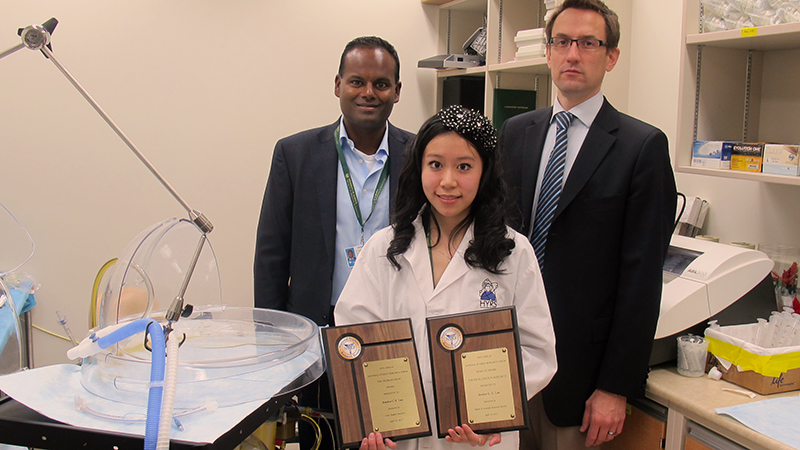
Jessica Luc (centre) with her supervisors Jayan Nagendran (L) and Darren Freed.
Improving the quality of organs for transplant and ALS diagnosis are two topics at the forefront of research for two Faculty of Medicine & Dentistry students, Jessica Luc and Roger Croutze, who had the opportunity to showcase their cutting-edge research in these topics at the annual National Student Research Forum in Galveston, Texas, April 23-24.
Luc, a first-year medical student with aspirations to become a cardiac surgeon and obtaining a PhD during residency, claimed two of the conference's top awards: the Osler Essay Award, which celebrates success in translational research, and the Sigma Xi Scientific Research Award, an overall award for excellence in research. According to Jayan Nagendran, one of Luc's supervisors, it is one of the most prestigious awards a medical student can win.
"Jessica has shown tremendous initiative and hard work to gain all the experience and results she has in the lab, and has shown a great deal of independence," says Nagendran. "It is unique for someone at her stage of career and education to have done that."
"I want to share this award with them," Luc says in reference to Darren Freed and Nagendran, her two supervisors from the Division of Cardiac Surgery who are both alumni of the University of Alberta medical school. "All of this would not have been a possibility without their unwavering support and guidance, as well as the funding that was provided to us for this research."
Luc's award-winning project was centred on improving the quality of lungs for donation through a process known as ex vivo organ perfusion. Ex vivo organ perfusion is a process of pumping supportive fluids through the organ at normal temperature to perfuse and ventilate lungs to keep them alive outside of the body. This technology provides the opportunity to functionally assess and pharmacologically manipulate the lung prior to transplantation. Luc's work was funded by Alberta Innovates - Health Solutions.
Roger Croutze, second-year medical student, presenting his findings from his time in the research lab of Sanjay Kalra, a neurologist who has dedicated his career to researching novel imaging techniques to diagnose Amyotrophic Lateral Sclerosis (ALS), a fatal neurodegenerative disease that causes loss of muscle control and death within two to five years. Using brain magnetic resonance images (MRI) and magnetic resonance spectroscopy (MRS), Croutze hoped to determine whether chemical profile or structural change in the motor cortex is more effective in diagnosing ALS.
He used computer software to analyze brain MRIs, determining the thickness of the motor cortex by measuring the distance between the white and grey matter; considering their motor deficits, he and Kalra predicted that patients with ALS would have a thinner motor cortex than healthy controls. In the second stage, Croutze examined the chemical profile obtained through the use of magnetic resonance spectroscopy.
"You look at cerebral or neuronal metabolites-basically chemicals that are found in the brain. You can find which ones are highest in the motor cortex and then compare the level of metabolites in people with ALS to normal, healthy controls," he explains. "The ones we looked at were creatine, N-acetylaspartate and choline."
Kalra and his team believe their research will help improve early diagnosis of ALS, allowing for early intervention, improvements in quality of life, and evaluation of drug trials. This research was funded by Alberta Innovates - Health Solutions.